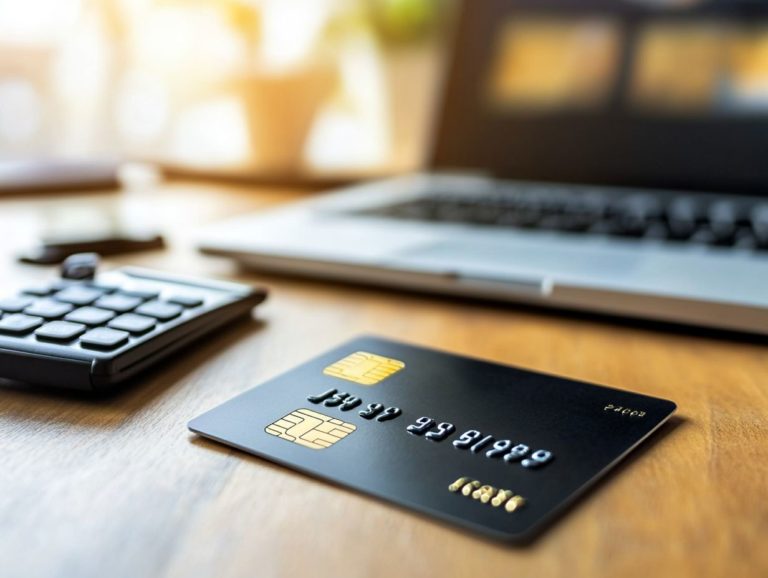How to Understand Credit Card Billing Cycles?
Understanding your credit card billing cycle is vital for mastering your financial management.
This guide delves into the nuances of your credit card statement, clearly outlining charges and payments. You will discover why being aware of your billing cycle is essential for maintaining a healthy credit score and avoiding unnecessary interest charges.
You ll also get practical tips for determining and managing your billing cycle, as well as insights into common pitfalls to avoid. Take charge of your finances today!
Contents
- Key Takeaways:
- What is a Billing Cycle?
- Understanding Your Credit Card Statement
- Importance of Knowing Your Billing Cycle
- How to Determine Your Billing Cycle
- How to Manage Your Billing Cycle
- Common Mistakes to Avoid
- Frequently Asked Questions
- What is a credit card billing cycle?
- When does a credit card billing cycle start?
- How long is a credit card billing cycle?
- What is the difference between a statement date and a due date?
- How is interest calculated during a credit card billing cycle?
- What happens if I miss a payment during a credit card billing cycle?
Key Takeaways:
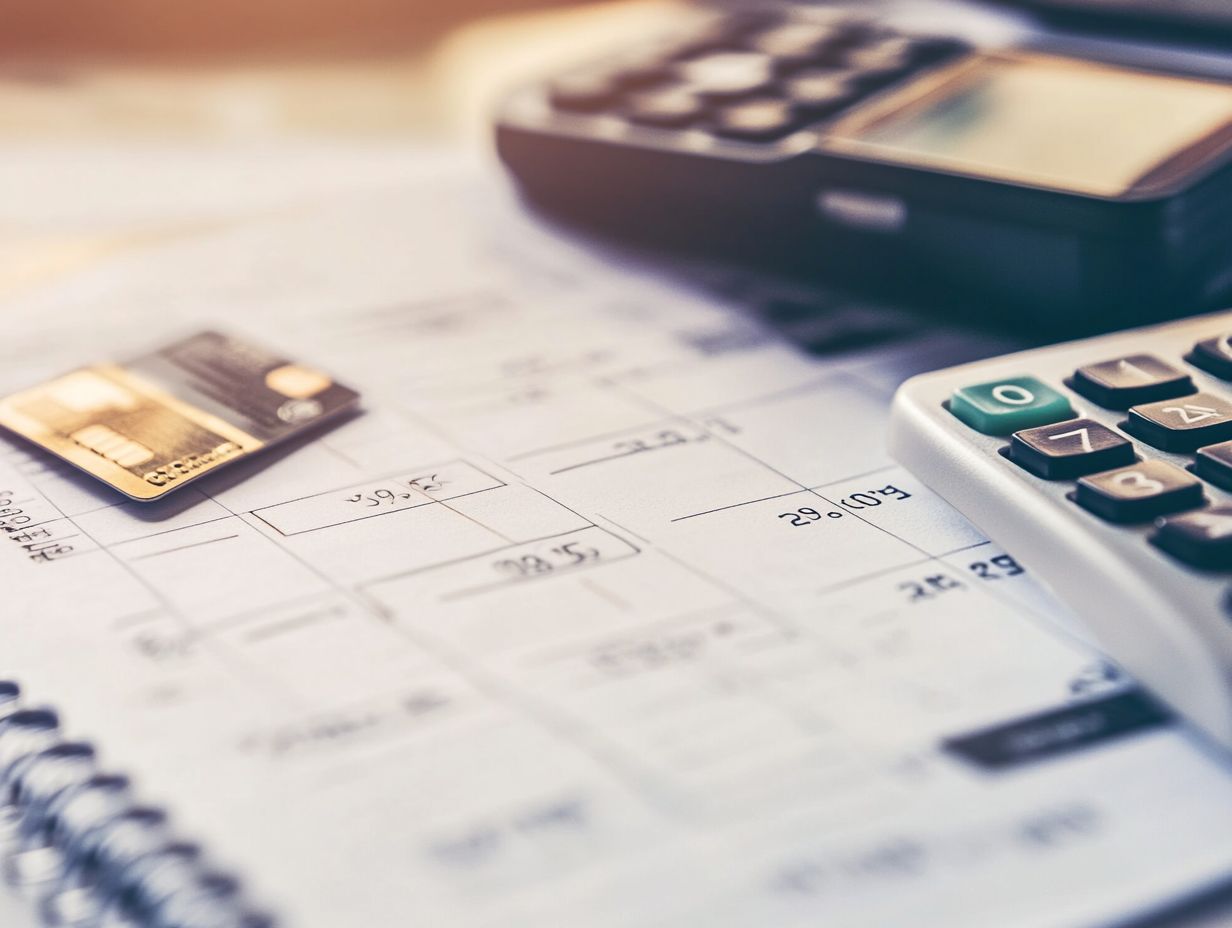
- Knowing your billing cycle is crucial for managing your credit card effectively and avoiding unnecessary interest charges.
- Understanding your credit card statement and keeping track of your billing cycle can help you improve your credit score.
- To determine your billing cycle, check your credit card statement or contact your credit card company. Review the statement carefully for any errors.
What is a Billing Cycle?
A billing cycle is the timeframe between monthly billing periods for your credit card account, usually lasting about 30 days. Within this period, the credit card issuer gathers all your account activity, including transactions, payments received, and any fees incurred, ultimately leading to the issuance of your billing statement.
Grasping the nuances of your billing cycle is essential for effective financial planning, as it directly influences your statement balance, due date, and overall financial management. Understanding this cycle enables you to navigate your finances with greater efficiency and control.
Understanding Your Credit Card Statement
Understanding the intricacies of your credit card statement is vital for effective financial management. It offers a comprehensive overview of your account, detailing the statement balance, minimum payment due, and all transactions during the billing cycle.
Each statement captures every charge, payment received, and any interest or fees incurred. This transparency allows you to monitor your credit utilization and take charge of your finances with confidence.
Breakdown of Charges and Payments
The breakdown of charges and payments on your credit card statement provides valuable insight into your spending habits, revealing credit card fees, payment options, and any applicable statement credits.
By examining entries such as annual fees, late payment charges, and interest rates, you gain a clearer understanding of the financial implications tied to your credit use. If you travel frequently, understanding foreign transaction fees is crucial, as these charges can accumulate quickly.
Keeping tabs on recurring payments, like subscriptions or memberships, helps you budget more effectively and maintain control over your finances. Additionally, monitoring statement credits from offers or returned purchases can lead to unexpected savings.
Ultimately, interpreting these elements clearly helps you make informed financial decisions and fosters healthier spending habits.
Importance of Knowing Your Billing Cycle
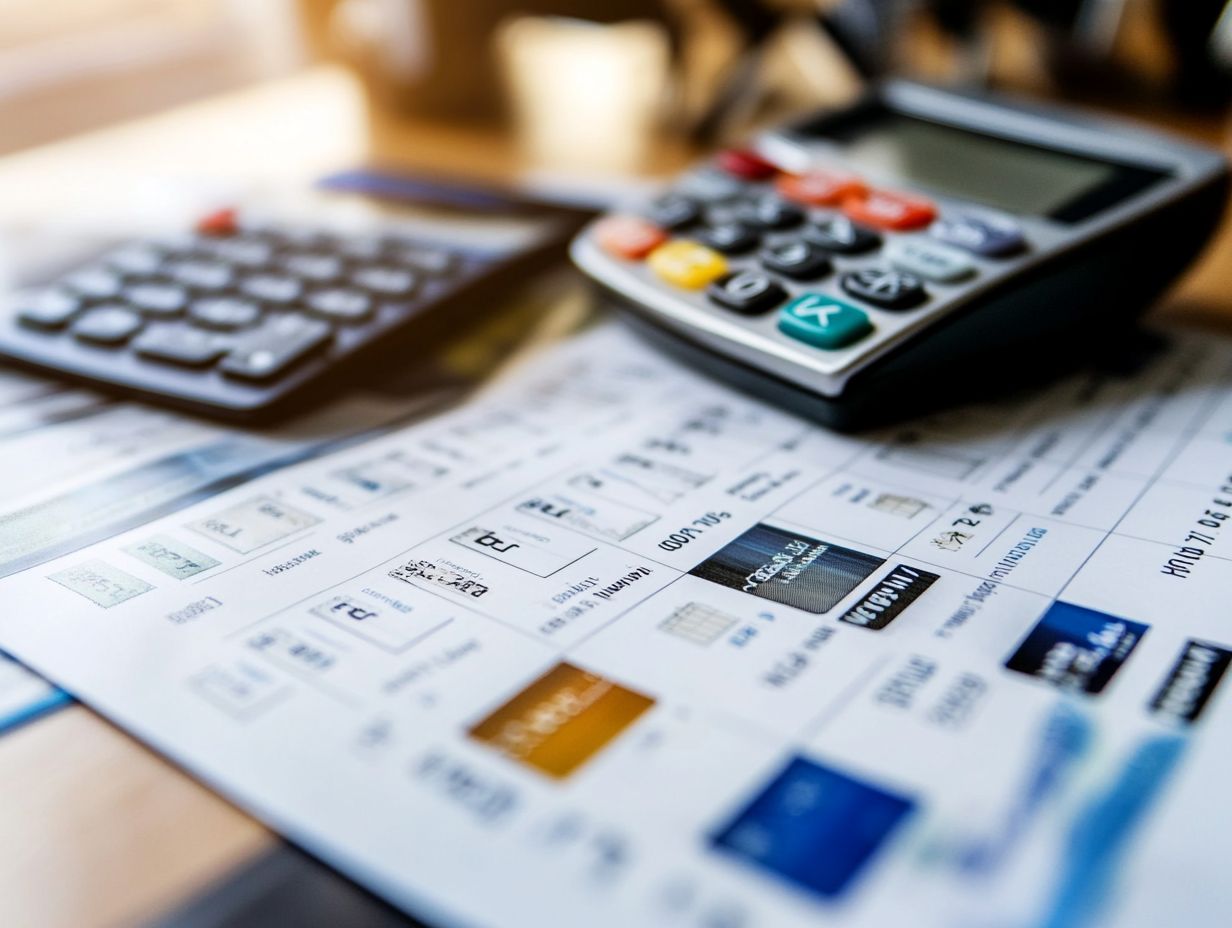
Understanding your billing cycle is vital for maintaining a strong credit profile. It directly impacts your credit score, interest charges, and the grace period for payments.
By knowing the length of your billing cycle, you can plan your payments strategically, effectively manage how much of your available credit you re using, and avoid late fees that could harm your financial standing.
This knowledge empowers you to take control of your credit health and make informed financial decisions.
Impact on Credit Score and Interest Charges
The influence of your billing cycle on your credit score and interest charges is significant. Timely payments enhance your payment history and credit utilization ratio, both essential factors reported to credit bureaus.
Your credit utilization rate, which means how much of your available credit you are using, plays a key role in assessing your credit worthiness. When you make payments on or before the due date, it demonstrates reliability and responsibility, positively impacting your overall score.
Missed or late payments can lead to higher interest rates and a diminished score, as they raise red flags for lenders.
By keeping a low utilization ratio, you present a more favorable financial profile, reinforcing your trustworthiness in the eyes of lenders.
How to Determine Your Billing Cycle
Determining your billing cycle is a simple yet crucial task. Start by reviewing your credit card agreement and associated account details. These documents typically provide a clear outline of your billing cycle and payment due dates.
Most credit card holders receive monthly statements. These serve as an excellent resource for tracking your billing cycles and enhancing your understanding of your financial commitments. By staying informed, you can navigate your financial landscape with greater confidence and ease.
Steps to Find Your Billing Cycle
Finding your billing cycle is straightforward and can be accomplished with just a few simple steps. Start by checking your monthly statements. If you need further clarity on the due date or account activity, don t hesitate to contact your credit card issuer.
First, log into your online account or app linked to your credit card; this is where you ll typically uncover details about your current billing cycle. Regularly reviewing your monthly statements is wise, as they provide valuable insights into your past charges and payment history.
If you encounter any confusion regarding your billing cycle or notice charges that seem out of place, reach out to your credit card issuer’s customer service without hesitation. They are there to clarify your cycle dates and assist with any discrepancies, ensuring you remain informed and can manage your finances with confidence.
How to Manage Your Billing Cycle
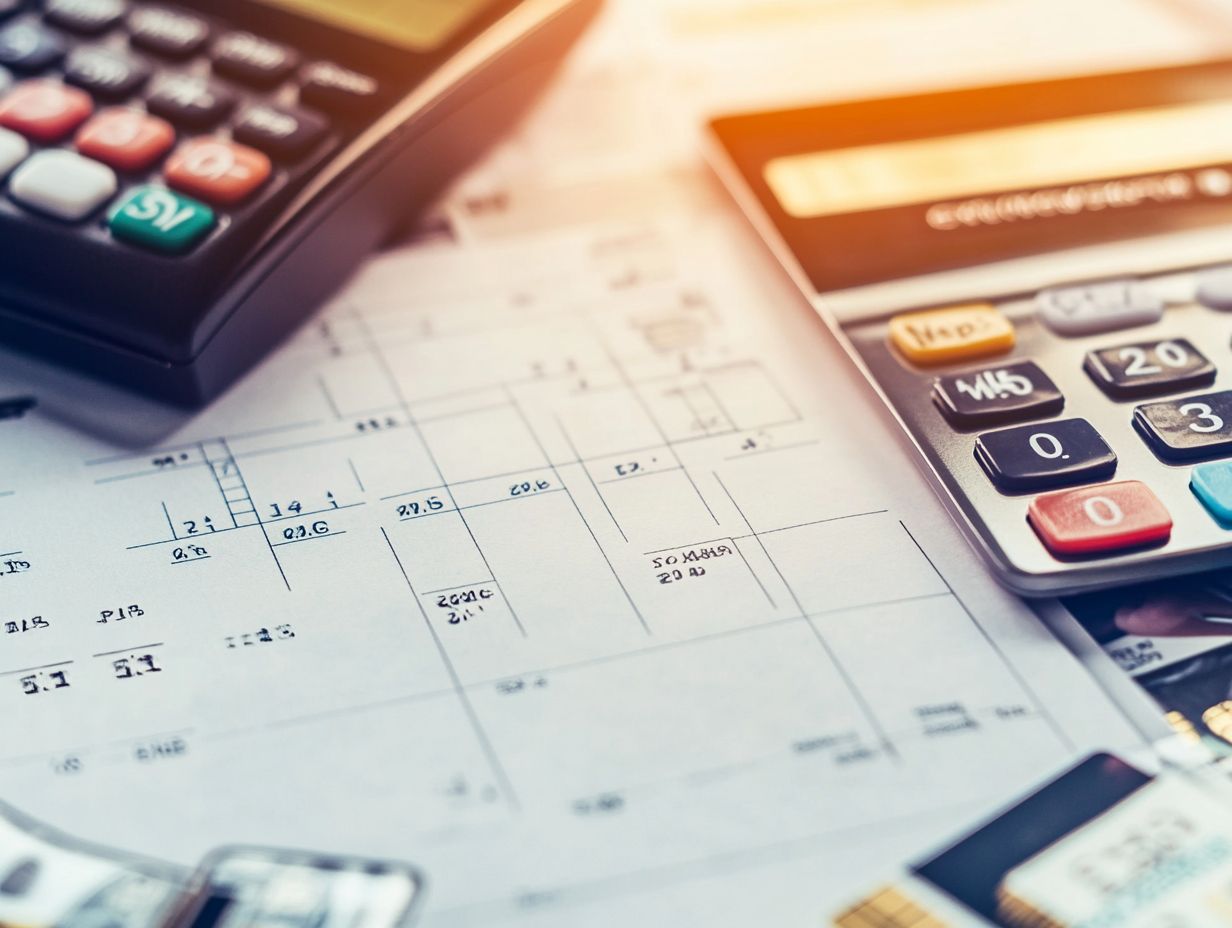
Mastering your billing cycle now can safeguard your financial future! You can stay on top of things by using a few handy strategies for preserving financial stability. This includes staying on top of your payments, budgeting wisely for your purchases, and exploring diverse payment options during the grace period to avoid any interest charges.
Tips for Staying on Top of Payments
To stay on top of your payments, consider leveraging various payment options, setting timely reminders, and embracing financial planning practices that help you avoid late fees and cultivate a positive payment history.
Exploring diverse payment methods like automatic deposits, online payment platforms, and mobile payment apps can significantly streamline your financial transactions.
By implementing a reminder system, whether it s through calendar alerts or budgeting apps, you ensure that no due date slips through the cracks. Establishing a comprehensive financial plan that includes a budget will enable you to track your expenses and allocate funds effectively for necessary payments.
By combining these strategies, you can enhance your financial stability, nurture a healthier credit score, and ultimately savor a greater peace of mind when managing your finances.
Common Mistakes to Avoid
Steering clear of common pitfalls in your billing cycle is crucial for maintaining your financial well-being. Failing to make timely payments or misunderstanding minimum payment requirements can result in late fees and elevated credit card charges, significantly impacting your financial landscape.
Prioritizing attention to these details will help you safeguard your finances and enhance your overall financial health.
Start managing your billing cycle today and watch your financial health improve!
Errors to Watch Out For
When managing your credit card account, keep a close watch on your billing statement. Look out for any inaccuracies, especially in statement credits, as they can confuse your account details.
Errors can come in many forms. You might see missing payments, incorrect interest charges, or unknown transactions all of which could hurt your financial health.
By regularly reviewing your billing statements, you ensure the accuracy of the charges and safeguard yourself against potential fraud. Ignoring these errors can distort your budget calculations and harm your credit score.
Contact your bank immediately if you spot any mistakes. Provide documentation of the inaccuracies to facilitate corrections and help prevent similar issues in the future. Being proactive in monitoring your accounts plays a vital role in maintaining your overall financial well-being.
Frequently Asked Questions
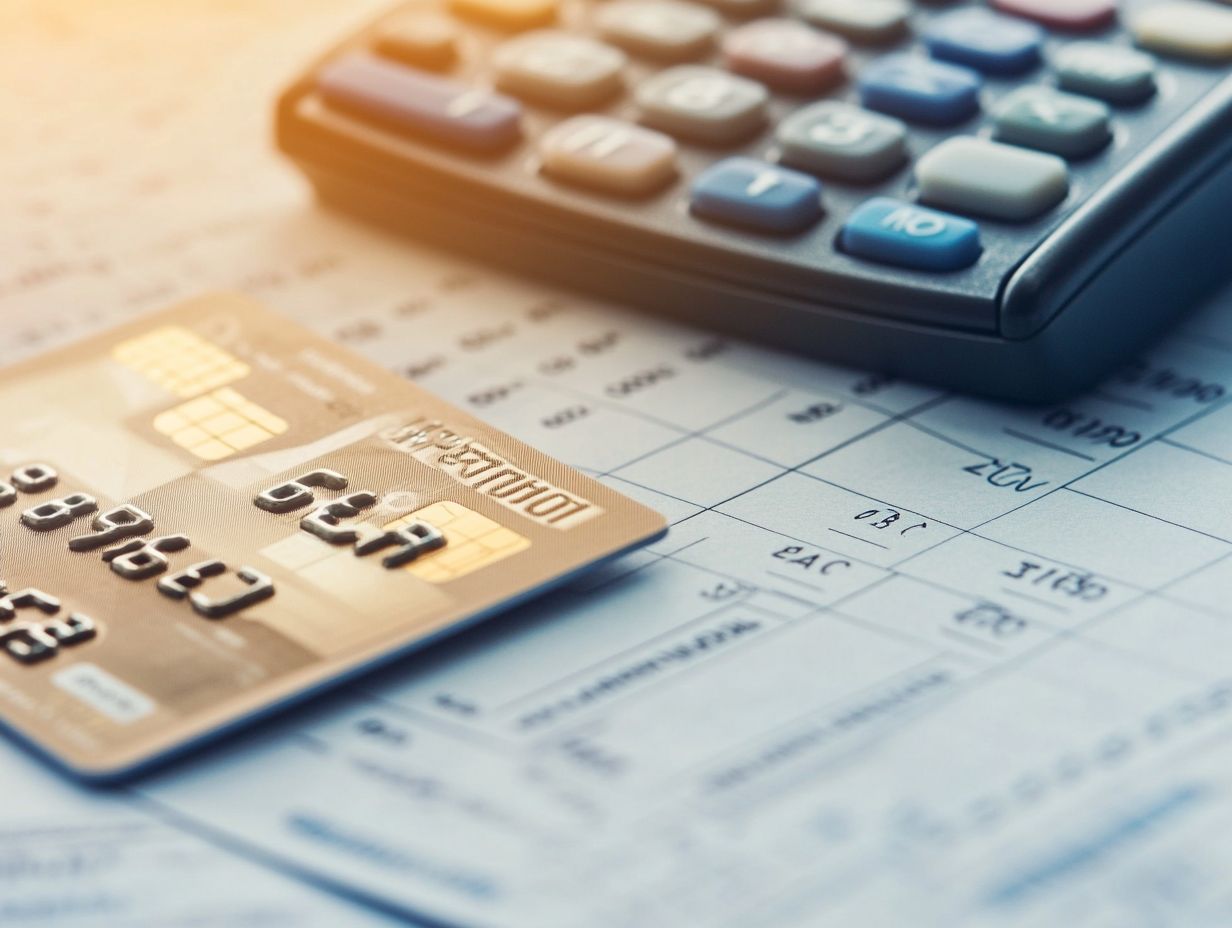
What is a credit card billing cycle?
A credit card billing cycle is a period of time, usually one month, in which the purchases and payments made on a credit card are recorded and calculated for billing purposes. To gain deeper insights, it’s helpful to explore understanding credit card billing cycles.
When does a credit card billing cycle start?
The start date of a credit card billing cycle varies depending on the credit card company, but it is typically the same day each month for a specific cardholder. You can find the start date on your credit card statement or by contacting your credit card company.
How long is a credit card billing cycle?
Most credit card billing cycles are 30 days, but they can range from 28 to 31 days. Understanding what a credit card statement cycle is important to keep track of the length of your billing cycle and ensure you are making payments on time.
What is the difference between a statement date and a due date?
The statement date is the end date of your credit card billing cycle, while the due date is the date by which you must make a payment on the balance owed. It is typically around 21-25 days after the statement date.
How is interest calculated during a credit card billing cycle?
Interest is calculated based on the average daily balance of your credit card during the billing cycle. This is determined by adding up the balances at the end of each day and dividing by the number of days in the billing cycle.
What happens if I miss a payment during a credit card billing cycle?
If you miss a payment during a billing cycle, you may be charged a late fee and your interest rate may increase. It is important to make payments on time to avoid these consequences and potential damage to your credit score.
Stay informed and protect your finances. Review your billing statements today!





